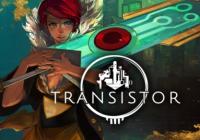Transistor (PlayStation 4) Review
By Az Elias  07.07.2014
07.07.2014

Supergiant Games made a name for itself with Bastion, praised for its sublime visuals and storytelling, and has since been hard at work on its next anticipated project. That project is now here, as Transistor is released on PC and PlayStation 4, the latter platform's version of which Cubed3 takes the handle of.
Transistor follows very much in the same vein as Bastion, in that the story is narrated continuously throughout, by a charming young man trapped inside a blade that the game takes its title from. The truth is it's only his voice that's transferred to the Transistor, as his body lies slumped and pierced by the sword at the very beginning. It is his lover, Red, that finds herself on the run and in possession of this mysterious artefact, as she tries to uncover what exactly is going on in the weird and wonderful world of Cloudbank, and who is trying to hunt her down.
Linear is sometimes best when telling a story, and this is the approach taken with Transistor. Running through the cyberpunkish streets and alleyways of Cloudbank in this fashion delivers mixed feelings, though. On the one hand, the artistic vision is realised beautifully and is quite magnificent in parts, where it cannot be helped but to stop and marvel at the intricacies of the isometric town designs, fondly reminding of the sublime pre-rendered settings of Final Fantasy VII and its brethren, but on the other, that point A to point B procedure only acts to cry out for a greater degree of exploration and interactivity.

That's really the upset here; Transistor feels a little too passive. Think Final Fantasy XIII. For a role-playing title, it seems like a chunk of the game is missing. The fact that each screen that is passed through has very little going for it other than to take in the architecture and atmosphere, and wipe out any enemies contained within, means things begin to err on the slightly repetitive side rather quickly.
The story, while intriguing, never really manages to hook players into this unique world, and it is all over in a flash. There's nothing wrong with short games in the slightest, but in the four to six hours it takes to see Transistor to its conclusion, very little is done to give a full understanding of just what exactly is playing out. It may be with purpose that Supergiant Games immediately presents the New Game+ option at the end of the credits; multiple playthroughs can help to look at the story in a slightly different way, hopefully helping to better put things into comprehension. A lot is left up to the imagination, though, and some clarity and fleshing out could have offered a more engaging plot.

Battle encounters are enacted on most screens, and that is where Transistor initially shows more promise. Assigning abilities that attack, hinder and evade to each of the four face buttons, Red is able to string together a sequence of moves in one swift motion by using the pre-planning Turn option of the blade, freezing time to plot a course that unleashes the desired effects. As more abilities unlock during the story and upon levelling up, the combat begins to get a little deeper, where certain combinations create some potent arrangements that can overwhelm enemies in swoops.
Time spent in the testing arenas helps to reveal effective combinations, but it has to be said that the combat doesn't really evolve into anything more substantial than what is presented to begin with. Once a killer combination has been found, rarely is there any desire to mix things up with other functions; sticking to what works best is generally an easy cop out.

However, difficulty level can be adjusted by the player mid-game by turning on 'limiters' - options that can increase the experience points earned at the cost of gifting advantages to the enemy, such as making them stronger or respawn faster. This does help to prolong the combat events, but there seems little cause to apply it too much when it results in trying to run and hide constantly before the Turn command can be used again, at which point things become frustrating. New Game+, with its tougher enemies earlier on, gives more reasons to work on practicing other combinations of moves and use limiters to level up faster, rather than passing on the first journey through.
In general, though, whilst clearly a remarkable case of artistic and audio design, Transistor slips up as a role-playing game by lacking in a captivating story and gameplay that doesn't develop into addictive stakes. That said, its shortness works in its favour in the end; it's over before it becomes overly repetitive, yet this length also makes replays of it more appealing in the future.

Cubed3 Rating
Good
Despite following in Bastion's footsteps, Transistor doesn't quite manage to deliver as compelling and memorable an experience, even though it has clearly been crafted with such heartfelt intent. Whilst the premise is full of mystery and intrigue, during the course of the short story it never really draws players in as it would have many people believe after its promising start. A case of style over substance, but still a game that deserves the attention of those after something original and rather beautiful - only wait till it goes on sale first.

![]() 6/10
6/10
![]() 6/10
(1 Votes)
6/10
(1 Votes)
 Out now
Out now  Out now
Out now  None
None  Out now
Out now Comments
Comments are currently disabled

 Sign In
Sign In Game Details
Game Details Subscribe to this topic
Subscribe to this topic Features
Features







 Top
Top

